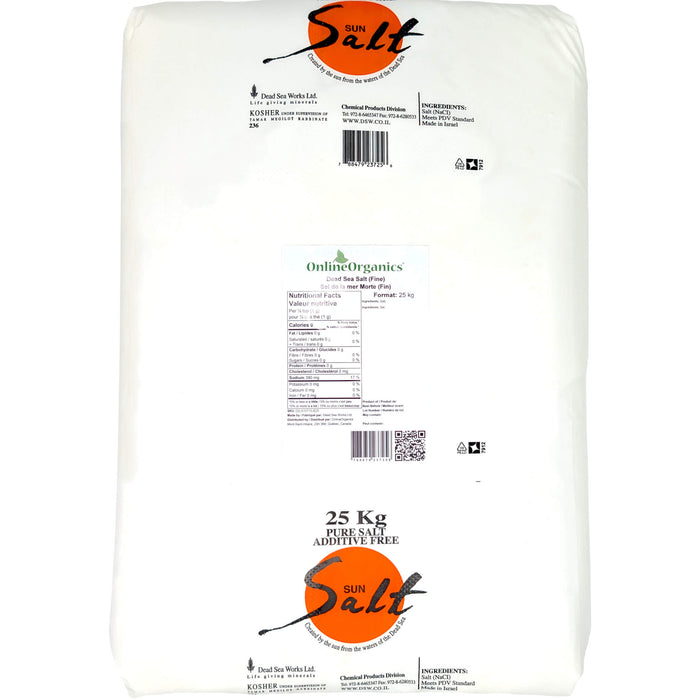
Dead Sea Salt (Fine)
Specifications (Tap to open):
Category:
Shelf Life:
Country of Origin:
Allergen Information (Tap to open):
We take your health and safety very seriously. If you have any allergen inquiries please Contact Us.
If an allergen is present in the product, it will be clearly declared in the ingredients.
"May Contain" statement NEW FOR 2025 (Progressive rollout):
- In 2025 we will be progressively updating our labels and product pictures with our new label that now include a "May Contain" statement.
- The Canadian Food Inspection Agency (CFIA) dictates that "Cross-contamination statements may be declared by food manufacturers and importers".
- That said, we hold ourselves to much higher standards than the CFIA and Health Canada rules oblige. Most companies do not and you will only rarely see "May Contain" statements.
- If there is a remote chance that there might be cross-contamination of a priority allergen, we will declare it on the product label in the form of a "May Contain" statement.
- A "May Contain" statement does not mean that the allergen is present in the product, it is simple a precautionary measure we take to stay the most transparent possible.
- If an allergen is present in the product, it will be clearly declared in the ingredients.
- For example our Quebec made flours come from a mill that makes both oat and wheat flours. Since both allergens are present in the mill we automatically declare the possibility of cross-contamination even if all precautionary measures are taken.
- Only priority allergens are declared in the "May Contain" statement, which are:
- Cereals & Grains: Triticale, Barley, Oats, Rye, Wheat.
- Tree Nuts: Almonds, Brazil Nuts, Cashews, Hazelnuts, Macadamia Nuts, Pecans, Pine Nuts, Pistachios, Walnuts.
- Peanuts
- Sesame
- Eggs
- Milk
- Soy
- Mustard
- Fish
- Seafood: Crustaceans, Molluscs.
- Sulphites
- Priority allergens are decided by government agencies and health boards. To read more on the subject see "Common food allergens - Priority allergens" published by the CFIA.
- Full CFIA cross-contamination statement explanation "Food allergen cross-contamination (or precautionary) statements".



Our fine dead sea salt is produced by evaporating sea water from the dead sea which conserves the trace elements found in sea water such as potassium, iron, and calcium.
Much less processed than table salt which is mined from underground salt deposits and heavily refined. Table salt also has iodide and anti-clumping chemicals added.
While salt remains salt no matter from where it comes from, the benefits of the multitudes of trace elements found in dead sea water and natural evaporation are a much better choice than heavy refined iodized table salt.
Our dead sea salt has absolutely no additives added and has been naturally evaporated using sunlight in Israel.
Is this salt food-grade?
- All our products are of food grade quality. Our Dead Sea salt is unrefined, pure no additive salt from the Dead Sea. Produced by evaporation of Dead Sea water in the sun.
- While the producer Dead Sea Works Ltd. makes different grades of salt, this one is their food grade quality with no additives.
Why is my salt clumpy?
- While we strive to deliver a perfect smooth sand like salt, it is possible that your salt will develop clumps. This is perfectly normal as our salt is 100% pure with no additives.
- Regular table salt has anti-caking agents added like: calcium aluminum silicate, calcium phosphate tribasic, calcium silicate, calcium stearate, magnesium carbonate, magnesium silicate, magnesium stearate, propylene glycol, potassium ferrocyanide trihydrate, sodium aluminum silicate, and/or sodium ferrocyanide decahydrate.
- We prefer clumps over ingesting chemicals, they are easy to break with just a butter knife.
General Storage Tips:








